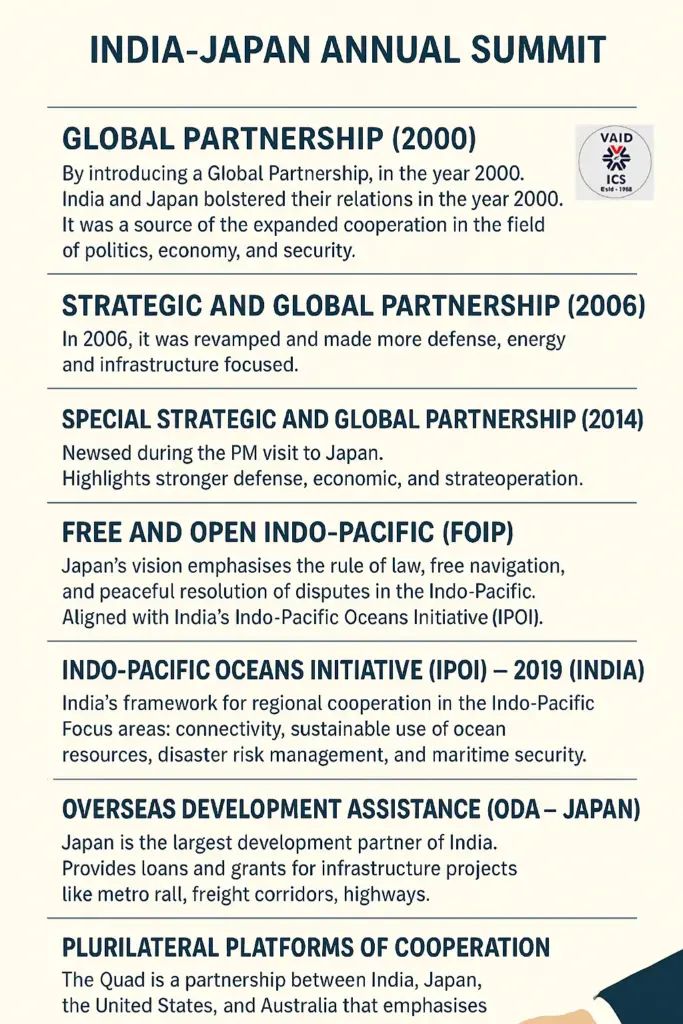August 29, 2025
India-Japan Annual Summit
Why in the News?
Modes of partnership in the annual summit of India and Japan and India Russia have been the longest and most constant schemes of the annual summit which have led to the development of India and Japan. The article highlights the India-Japan Annual Summit and its importance in strengthening bilateral ties.
- Focus on India-Japan partnership through regional vision, mutual trust, and common values.
Key Points about Key Terms: India-Japan Annual Summit
Global Partnership (2000):
- By introducing a Global Partnership, India and Japan bolstered their relations in the year 2000.
- It was a source of the expanded cooperation in the field of politics, economy, and security.
Strategic and Global Partnership (2006):
- In 2006, it was revamped and made more defense, energy and infrastructure focused.
Special Strategic and Global Partnership (2014):
- Newsed during the PM visit to Japan.
- Highlights stronger defense, economic, and strategic cooperation.
Free and Open Indo-Pacific (FOIP):
- Japan’s vision emphasizes the rule of law, free navigation, and peaceful resolution of disputes in the Indo-Pacific.
- Aligned with India’s Indo-Pacific Oceans Initiative (IPOI).
Indo-Pacific Oceans Initiative (IPOI) – 2019 (India):
- India’s framework for regional cooperation in the Indo-Pacific.
- Focus areas: connectivity, sustainable use of ocean resources, disaster risk management, and maritime security.
Overseas Development Assistance (ODA – Japan):
- The largest development partner of India is Japan.
- Provides loans and grants for infrastructure projects like metro rail, freight corridors, highways, etc.
Plurilateral Platforms of Cooperation:
- The Quad is a partnership between India, Japan, the United States, and Australia that emphasizes security and economic collaboration in the Indo-Pacific region.
- International Solar Alliance (ISA) can be defined as a worldwide clean-energy project led by India.
- Coalition Disaster Resilient Infrastructure (CDRI) -Redirecting infrastructure around the world to deal with disasters.
- To enhance and diversify global supply chains, India, Japan, and Australia came together to establish the Supply Chain Resilience Initiative (SCRI).
Coalition for Disaster Resilient Infrastructure (CDRI):
Introduction: In September 2019, Prime Minister Narendra Modi addressed the UN Climate Action Summit held in New York.
Headquarters: New Delhi, India
Objective:
- To support strong and resilient infrastructure systems that can absorb the impacts of climate changes and other catastrophes.
- Provide technical support and capacity-building for infrastructure planning.
- Assist nations (in particular weak ones) to minimize casualties of crises.
Members:
- As of 2025, the group includes 39 member nations along with 7 international bodies.
- Both advanced markets (USA, UK, Japan, France, etc.) and developing countries are included.
Supply Chain Resilience Initiative (SCRI):
Launched: April 2021
Members: India, Japan, and Australia
Objective:
- To lessen reliance on China-prone supply chains (in particular, revealed during COVID-19).
- Diversify supply chains across Indo-Pacific economies.
- Promote transparent, resilient, and sustainable supply networks.
August 27, 2025
August 25, 2025
August 23, 2025
August 23, 2025

